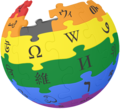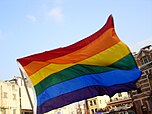
Back بوابة:مجتمع الميم Arabic Portal:LGBT Azerbaijani Партал:ЛГБТ Byelorussian Партал:ЛГБТ BE-X-OLD প্রবেশদ্বার:এলজিবিটি Bengali/Bangla Porched:Revelezh (LGBT) Breton دەروازە:کۆمەڵگەی پەلکەزێڕینە CKB Portal:Homo- und Bisexualität German Portal:LGBT DIQ Πύλη:ΛΟΑΤ Greek
| Main page | WikiProjects & Things you can do |

|
The LGBTQ+ Portal |

|

|

|
Introduction LGBT is an initialism that stands for "lesbian, gay, bisexual, and transgender". It may refer to anyone who is non-heterosexual, non-heteroromantic, or non-cisgender, instead of exclusively to people who are lesbian, gay, bisexual, or transgender. The variant LGBTQ adds a Q for those who identify as queer (which can be synonymous with LGBT) or are questioning their sexual or gender identity, while LGBTQ+ adds a plus sign for "those who are part of the community, but for whom LGBTQ does not accurately capture or reflect their identity". Many further variations of the acronym exist, such as LGBT+ (simplified to encompass the Q concept within the plus sign), LGBTQIA+ (adding intersex, asexual, aromantic and agender), and 2SLGBTQ+ (adding two-spirit for a term specific to Indigenous North Americans). The LGBT label is not universally agreed to by everyone that it is generally intended to include. The variations GLBT and GLBTQ rearrange the letters in the acronym. In use since the late 1980s, the initialism, as well as some of its common variants, functions as an umbrella term for marginalized sexualities and gender identities. The earlier initialism LGB began to replace the term gay (or gay and lesbian) in the late 1980s to reference the broader community. When not inclusive of transgender people, the shorter LGB is still used. (Full article...) Selected article -Same-sex marriage, also known as gay marriage, is the marriage of two people of the same legal sex. marriage between same-sex couples is legally performed and recognized in 36 countries, with a total population of 1.5 billion people (20% of the world's population). The most recent country to legalise same-sex marriage is Greece. Two more countries, Liechtenstein and Thailand, are set to begin performing same-sex marriages in late 2024 or in early 2025. Adoption rights are not necessarily covered, though most states with same-sex marriage allow those couples to jointly adopt as other married couples can. In contrast, 35 countries (as of 2023) have definitions of marriage in their constitutions that prevent marriage between couples of the same sex, most enacted in recent decades as a preventative measure. Some other countries have constitutionally mandated Islamic law, which is generally interpreted as prohibiting marriage between same-sex couples.[original research?] In six of the former and most of the latter, homosexuality itself is criminalized. It is legally recognized in a large majority of the world's developed democracies; notable exceptions are Italy, Japan, South Korea and the Czech Republic. It is not yet recognized in any of the world's Muslim-majority states, though first steps are being taken in Kosovo. Some countries, such as China and Russia, restrict advocacy for same-sex marriage. (Full article...)Selected biography -Ann Weldy (born September 15, 1932), better known by her pen name Ann Bannon, is an American author who, from 1957 to 1962, wrote six lesbian pulp fiction novels known as The Beebo Brinker Chronicles. The books' enduring popularity and impact on lesbian identity has earned her the title "Queen of Lesbian Pulp Fiction". Bannon was a young housewife trying to address her own issues of sexuality when she was inspired to write her first novel. Her subsequent books featured four characters who reappeared throughout the series, including her eponymous heroine, Beebo Brinker, who came to embody the archetype of a butch lesbian. The majority of her characters mirrored people she knew, but their stories reflected a life she did not feel she was able to live. Despite her traditional upbringing and role in married life, her novels defied conventions for romance stories and depictions of lesbians by addressing complex homosexual relationships. Her books shaped lesbian identity for lesbians and heterosexuals alike, but Bannon was mostly unaware of their impact. She stopped writing in 1962. Later, she earned a doctorate in linguistics and became an academic. She endured a difficult marriage for 27 years and, as she separated from her husband in the 1980s, her books were republished; she was stunned to learn of their influence on society. They were released again between 2001 and 2003 and were adapted as an award-winning Off-Broadway production. They are taught in women's and LGBT studies courses, and Bannon has received numerous awards for pioneering lesbian and gay literature. She has been described as "the premier fictional representation of US lesbian life in the fifties and sixties", and it has been said that her books "rest on the bookshelf of nearly every even faintly literate Lesbian". (Full article...)Selected quote -
—Eric Allman (1955–), on Sendmail, his widely used email routing software
Current events
Selected image - 14 May 1928 issue of German lesbian periodical Die Freundin ("Girlfriend")
Did you know… -
This month's birthdays
Selected lists
Related portalsFeatured contentThe following articles and lists have been identified as some of the best produced by the Wikipedia community:
TopicsCategoriesAssociated WikimediaThe following Wikimedia Foundation sister projects provide more on this subject:
Discover Wikipedia using portals |
© MMXXIII Rich X Search. We shall prevail. All rights reserved. Rich X Search























